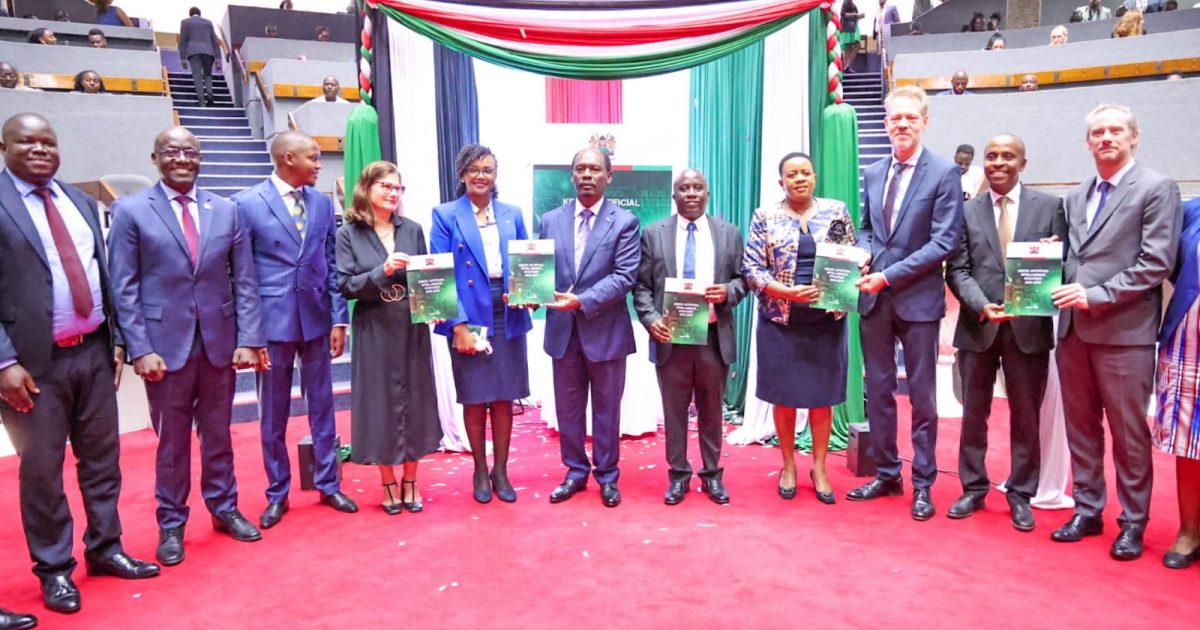Information, Communications, and the Digital Economy (MICDE) Cabinet Secretary (CS) William Kabogo has launched Kenya’s Artificial Intelligence (AI) 2025-2030 Strategy, marking a major step in the country’s digital transformation journey.
The strategy positions Kenya as a regional leader in AI innovation, research, and commercialization, ensuring responsible AI adoption to drive economic growth, job creation, and improved service delivery.
Speaking at the launch at Kenyatta International Convention Centre (KICC) in Nairobi, the CS emphasized Kenya’s commitment to shaping its digital destiny, not merely as a consumer but as an innovator and leader.
“AI is not a choice; it is an imperative. With a clear strategy, Kenya will harness AI’s potential while safeguarding ethical standards, security, and inclusivity,” said the CS.
“Kenya will not be just a consumer of AI; we will be active architects of our digital future, shaping its development and driving innovation,” said the CS.
According to the CS, the strategy is anchored on three key pillars including AI digital infrastructure, data and AI governance, and AI research and commercialization.
“The government is investing in robust digital infrastructure, AI education, and partnerships to position Kenya as Africa’s premier destination for AI-driven enterprises,” noted Kabogo.
Kabogo further reiterated that the government is making significant investments in digital infrastructure, AI education, and strategic partnerships to ensure that Kenya becomes Africa’s leading hub for AI-driven enterprises.
“Our goal is to create an ecosystem that fosters innovation, attracts investment, and positions Kenya as a global competitor in AI advancement,” he stated.
The strategy aligns with the National Digital Master Plan 2022-2032, Vision 2030 and the Bottom-Up Economic Transformation Agenda (BETA)
The CS called on stakeholders including academia, the private sector, and development partners to support AI adoption that enhances productivity, creates jobs, and drives sustainable economic growth.
With this strategy, Kenya is set to harness AI’s potential responsibly, ensuring that the technology benefits all citizens while maintaining ethical standards, security, and inclusivity.
Speaking during the function, Principal Secretary (PS) for ICT and Digital Economy, Engineer John Tanui, emphasized that Kenya has positioned itself as a hub for innovation through the launch of several digital innovation centres, reinforcing Kenya’s status as a continental leader in innovation and artificial intelligence.
The PS said that recognizing the importance of infrastructure, Tanui highlighted the government’s approval of a national cloud policy, paving the way for increased access to powerful digital tools, including artificial intelligence.
“We are on track, and this strategy is the next great thing for our country,” Tanui affirmed, expressing appreciation for the continued support from international partners, including the United Nations Development Programme (UNDP).
European Union (EU) Ambassador to Kenya, Henriette Geiger, commended Kenya’s approach to AI, highlighting its emphasis on human-centred growth, inclusion, and ethical development.
She acknowledged the EU’s support through its Digital Transformation Centre, reaffirming its commitment to fostering responsible AI adoption in the country.
“AI should not be just a tool for progress but the foundation for societal transformation, promoting fairness, justice, and equity,” said Ambassador Geiger.
Germany commended Kenya’s AI leadership, with Deputy Ambassador Alexander Fierley reaffirming Germany’s support, emphasizing that AI’s impact depends on responsible data ownership and consumer protection.
Fierley lauded Kenya’s collaborative approach and stressed the need for strong governance, ethical frameworks, and trust in digital systems to ensure AI serves the public interest.
The ambassador noted that Kenya’s position as a technological hub made it a key partner in shaping ethical and inclusive AI development, revealing that France has already made significant investments in Kenya’s AI ecosystem, particularly through academic collaboration.
Suquet further expressed gratitude to the Kenyan government and key stakeholders for their efforts in shaping the country’s AI strategy, while calling for responsible use of AI.
He pointed to ongoing partnerships with the University of Nairobi in science and technology, where AI is a central focus.
“Our commitment extends beyond technology; we want to invest in human capital. We have experience in AI, and we want to share it while also learning from Kenya’s expertise,” he said.
The launch signals Kenya’s readiness to lead in the global AI economy, ensuring the technology enhances productivity, creates opportunities, and fosters sustainable growth.
By Joan Ogolla and Emmanuel Mbuthia




